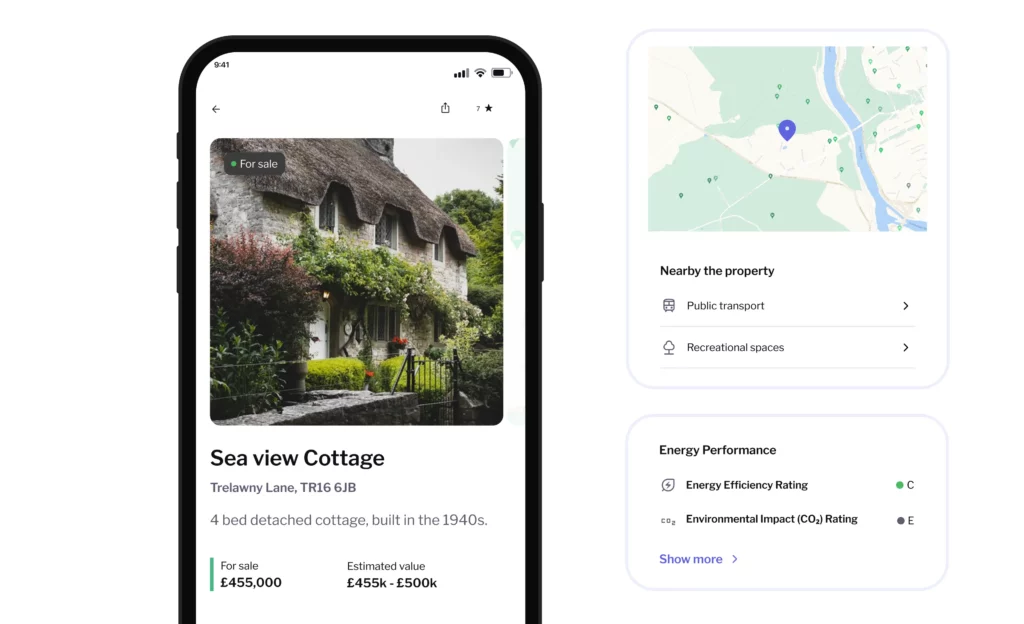The evolving landscape of PropTech in the UK
In recent years, the UK property sector has been poised at the edge of a digital metamorphosis. Once known for its traditionalist approach, the UK’s real estate industry is now embracing the transformative potential of PropTech. This digital evolution, driven largely by advances in technology, has the power to change the very fabric of the real estate market.
Whether it’s harnessing big data to predict rent changes with striking accuracy or utilising augmented reality to offer immersive property previews, the PropTech wave is reshaping the way the UK buys, sells, and interacts with properties. As we delve deeper into the nexus of property and technology, it’s becoming clear that the heart of this revolution is the unprecedented and expansive access to data. This upcoming revolution promises not just efficiencies and cost savings, but a more sustainable, transparent, and inclusive property market for the UK.

The current state of property transactions
The UK’s property market, despite its historical resilience and appeal, has not been without its challenges. One of the most glaring issues lies in the high fall-through rates of property transactions. Recent data from Quick Move Now underscores this, highlighting a concerning 27.3% collapse rate in property sales across England and Wales between July and September. Such statistics not only indicate a significant loss of time and resources for potential buyers and sellers but also highlight the broader implications of mistrust and disillusionment in the current system.
Yet, what causes these disruptions? The roots can often be traced back to the inefficient, antiquated methods still prevalent in the property transaction ecosystem. From agents juggling conflicting information to critical details going amiss or being misinterpreted, many transactions are built on shaky foundations. Buyers and sellers are frequently left navigating a labyrinth of incorrect assumptions and ambiguity. These inefficiencies not only prolong the transaction process but also amplify the risks of misunderstandings and misalignments.
Furthermore, as technology sweeps across various sectors, the property industry’s lag in digital adoption becomes even more pronounced. The reluctance to adapt to modern tools and methods — be it through big data analytics, augmented reality, or real-time transaction platforms — has further exacerbated the divide between consumer expectations and industry offerings. As the UK stands on the brink of a PropTech revolution, addressing these discrepancies becomes not just a matter of convenience, but of necessity, setting the stage for a more streamlined, transparent, and efficient property market.
Regulations and the direction towards transparency
The UK property sector, historically governed by a complex web of regulations and guidelines, is now at an inflection point. As consumer expectations rise and technology reshapes every corner of the industry, there’s an undeniable push for the industry to revamp its practices. Key to this transformation is the need for increased transparency and adherence to best practices that prioritise customer experience.
The introduction of regulations such as the Consumer Duty exemplifies the government’s intent to ensure that businesses within the property sector not only treat their customers fairly but also provide them with enhanced experiences. These regulations, while serving as a benchmark for property businesses, also reflect the broader shift in consumer expectations. Today’s consumers, influenced by seamless experiences in sectors like retail and banking, are not content with just any service; they demand timely, accurate, and relevant information available at their fingertips.
The trajectory is clear: regulations are steering the property industry towards more transparent practices, but it’s the union of these regulations with technological innovations that hold the potential to truly redefine the consumer experience. As consumers continue to voice their expectations and the industry recognises the immense benefits of adopting technology, the UK property sector is poised for a revolution — one that places transparency and customer-centricity at its core.

Significance of accurate valuations
The real estate domain has long been reliant on valuations to shape decisions, and the importance of accuracy in these evaluations can’t be overstated. From the most basic steps, like determining the correct price of a property, to more complex processes like navigating negotiations, securing mortgages, or making sound investment choices, valuations play a pivotal role.
However, traditional valuation methods have been fraught with challenges, including inconsistency, bias, and reliance on outdated comparables. Such inaccuracies in valuation can lead to a cascade of issues: prolonged negotiations, mortgage denials, and poor investment decisions, culminating in delays and frustration for everyone involved.
The introduction of Automated Valuation Models (AVMs) marks a significant shift in property valuation. These models use sophisticated algorithms and comprehensive, current data to provide precise property assessments quickly. AVMs surpass traditional methods by evaluating extensive data points, offering objective and timely valuations. The real transformation, however, comes from integrating AVMs with Application Programming Interfaces (APIs), which streamlines the entire real estate transaction process. APIs connect different platforms, ensuring that stakeholders have immediate access to accurate valuations. This integration facilitates quicker, smoother transactions and enhances service delivery, ultimately refining the real estate market to be more transparent and efficient for all participants.

Significance of location data
In the realm of real estate and property technology, it’s often said, “location, location, location.” But what if our understanding of ‘location’ could be deeper, more nuanced, and data-driven? The answer lies in the transformative power of location data, and its profound impact on the industry is just beginning to unfold.
A groundbreaking report from the Geospatial Commission highlighted how greater use of location data has the potential to significantly unlock innovation within the property sector. There’s a vast sea of untapped value in integrating geospatial intelligence into property dealings. From understanding micro-level climate impacts on properties to gauging the socio-economic pulse of a neighbourhood, location data offers insights that transcend mere physical coordinates.
The significance of location data extends even further. It encourages a proactive approach in the industry, where professionals can anticipate market shifts, understand infrastructural developments, and even predict future urban trends. This proactive stance, underpinned by data, enables agents and developers to meet the rising consumer expectations for seamless, informed, and holistic property experiences.

Nokkel’s data-driven innovations in UK’s PropTech landscape
The UK PropTech scene is buzzing with innovation, and Nokkel is leading the charge. This company is revolutionising the way we interact with real estate by combining tech smarts with deep industry knowledge. They jumped into the PropTech world with a mission to update the traditional property scene with cutting-edge technology, and they’re succeeding by blending valuable data insights with human wisdom.
Nokkel actively harnesses the power of data, with a genuine commitment to being customer-centric. Our strategy is carefully crafted, pinpointing audience preferences through insights like property types and geographical nuances to employ robust metrics for a holistic understanding of buyer & owner behaviours. This emphasis on data not only distinguishes us but also illuminates the future of UK PropTech: an industry where data’s transformative power couples with traditional real estate acumen to drive unparalleled advancements.
Nokkel’s approach exemplifies the UK PropTech’s future: a seamless blend of traditional property expertise with cutting-edge technological insights. Our commitment to data-driven strategies not only sets us apart but also shines a light on the transformative power of data in revolutionising the real estate landscape.

Integration with other industries
The PropTech movement in the UK is making waves far beyond the property world, highlighting how today’s industries are all linked together. As data powers PropTech to new heights, it’s also knitting closer ties with related fields, sparking unprecedented levels of teamwork and unity across different business areas.
One of the standout integrations is with FinTech. The marriage of financial technology and property technology offers a seamless, digitised experience for users, transforming how properties are bought, sold, and leased. Mortgage applications, traditionally bogged down by paperwork and delays, are now expedited through digital platforms, with real-time data analysis assessing borrower credibility. Moreover, planning for retirement, an essential aspect of personal finance, is also being influenced by PropTech advancements. Financial advisors, in their quest to provide clients with well-rounded advice, now incorporate real estate data, including automated valuation models and location data analytics, into their strategies. This holistic approach ensures that properties aren’t just viewed as homes or assets but also as crucial components of a long-term financial plan.
Additionally, the synergy between PropTech and Construction Tech (ConTech) cannot be ignored. As buildings become smarter and more sustainable, data flow between these sectors ensures that properties are not only built with modern amenities but also with features that prospective buyers and tenants value the most, from energy efficiency to advanced security systems.
All, in all…
The UK’s PropTech scene, anchored by the transformative power of data, is set to redefine the entire property ecosystem. This shift, underpinned by a synergy of regulatory frameworks and cutting-edge technology, is propelling the industry toward greater transparency and a stronger focus on customer needs. It’s a comprehensive transition that’s redefining how properties are understood, traded, and appraised in the digital realm. As this trend gains speed, the critical embrace of data and technology isn’t just revolutionising property dealings; it’s shaping a more equitable, forward-looking, and resilient future for the UK’s real estate market and its diverse participants.



